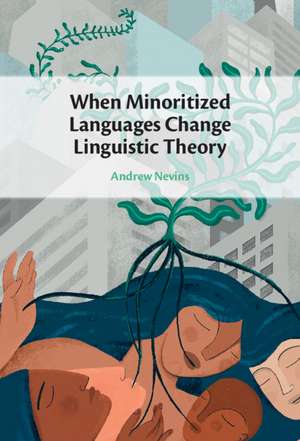When Minoritized Languages Change Linguistic Theory
Autor Andrew Nevinsen Limba Engleză Hardback – 30 noi 2022
Preț: 635.84 lei
Preț vechi: 714.43 lei
-11% Nou
Puncte Express: 954
Preț estimativ în valută:
121.69€ • 126.56$ • 101.83£
121.69€ • 126.56$ • 101.83£
Carte tipărită la comandă
Livrare economică 15-29 martie
Preluare comenzi: 021 569.72.76
Specificații
ISBN-13: 9781316516379
ISBN-10: 1316516377
Pagini: 280
Dimensiuni: 152 x 229 x 13 mm
Greutate: 0.45 kg
Editura: Cambridge University Press
Colecția Cambridge University Press
Locul publicării:Cambridge, United Kingdom
ISBN-10: 1316516377
Pagini: 280
Dimensiuni: 152 x 229 x 13 mm
Greutate: 0.45 kg
Editura: Cambridge University Press
Colecția Cambridge University Press
Locul publicării:Cambridge, United Kingdom
Cuprins
List of figures; Acknowledgements; List of abbreviations; 1. Expanding the canon: minoritization in the world and in linguistic theory; 2. Indexical shift in Zazaki and Uyghur; 3. Why ergative case requires structure in Basque and Ch'ol; 4. Closest conjunct agreement in Slovenian and Xhosa; 5. Configurationality of objects in Chichewa and Warlpiri; 6. Partial nasality in Maxakalí and Kaingang; 7. Symmetric hands in sign language phonologies; 8. Number-encoding on verbs in Hiaki and Chechen; 9. Conclusion: towards healthy futures in the language sciences; Bibliography; Index.
Recenzii
'This excellent survey of influential analyses of phenomena in a variety of less commonly studied languages puts a nail in the coffin of the myth that only standardized, national languages have contributed to linguistic theory and that formal linguistics has been based only on widely spoken languages. By highlighting important contributions to linguistics made by careful analysis of less commonly studied languages, Nevins shows convincingly that all human languages are of interest to formal linguists.' Jason Merchant, Vice Provost and Lorna P. Straus Professor of Linguistics, University of Chicago
'Nevins presents a delightful selection of case studies highlighting the importance of minoritized languages in shaping linguistic theory. Presented in a highly engaging and accessible style, this book will serve as a great entry point for those seeking to understand linguistic theory as both a window onto linguistic diversity and as an explanation of the unifying elements that lie beneath the surface variety.' Jonathan David Bobaljik, Department of Linguistics, Harvard University
'This book is truly one-of-a-kind. Nevins shows just how much the study of minoritized languages has contributed to real changes in the generative theory for the full gamut of core areas of generative linguistics. It is a must-read book for any generative theoretical linguist wanting to work with speakers of minoritized languages and varieties, stressing the social justice obligations that come with such research and the need to rethink how linguistics is taught.' Keren Rice, Professor of Linguistics, University of Toronto
'Nevins presents a delightful selection of case studies highlighting the importance of minoritized languages in shaping linguistic theory. Presented in a highly engaging and accessible style, this book will serve as a great entry point for those seeking to understand linguistic theory as both a window onto linguistic diversity and as an explanation of the unifying elements that lie beneath the surface variety.' Jonathan David Bobaljik, Department of Linguistics, Harvard University
'This book is truly one-of-a-kind. Nevins shows just how much the study of minoritized languages has contributed to real changes in the generative theory for the full gamut of core areas of generative linguistics. It is a must-read book for any generative theoretical linguist wanting to work with speakers of minoritized languages and varieties, stressing the social justice obligations that come with such research and the need to rethink how linguistics is taught.' Keren Rice, Professor of Linguistics, University of Toronto
Notă biografică
Descriere
Illustrated with fascinating examples throughout, this book shows the transformative effect minoritized languages have on linguistic theory.
